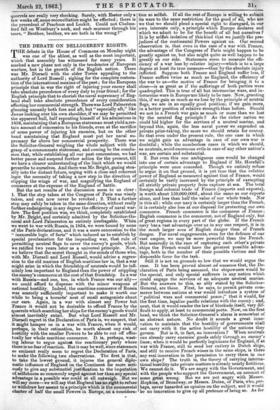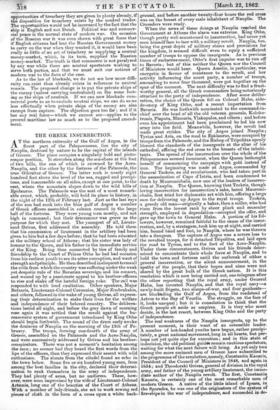THE DEBATE ON BELLIGERENT RIGHTS.
THE debate in the House of Commons on Monday night was one of the ablest, as well as the most important, which that assembly has witnessed for many years. It marked a new phase not only in the tendencies of European warfare, but in the growth of the English nation. There was Mr. Disraeli with the older Tories appealing to the authority of Lord Russell ; sighing for the complete restora- tion of the international maxims of the past ; for the European principle that in war the right of injuring your enemy shall take absolute precedence of every duty to your friend ; for the English principle that to cherish the naval supremacy of Eng- land shall take absolute precedence of every consideration affecting her commercial strength. Therewas Lord Palmerston glancing uneasily both fore and aft, but " especially aft," like Janus looking over his own shoulder, if we may be permitted the apparent bull, half repenting himself of his admissions in 1856, maintaining that a European statesman must yield a, cer- tai n amount of concession to his friends, even at the sacrifice of some power of injuring his enemies, but on the other hand maintaining that England must put her naval su- premacy far above her commercial prosperity. There was the Solicitor-General weighing the whole subject with the grasp of a consummate statesman, and coming to the conclu- sion that, while establishing all our past concessions, we had better pause and suspend further action for the present, till we have a clearer understanding of the limit which we would prescribe to ourselves. And there was Mr. Bright, gazing stea- dily into the distant future, urging with a close and coherent logic the necessity of taking a new step in the direction of clipping the wings of war, and magnifying the England of commerce at the expense of the England of battle. But the net results of the discussion seem to us clear : 1. That the step taken at the Congress of Paris was wisely taken, and can now never be revoked ; 2. That a further step may safely be taken in the same direction, without really further endangering in any degree the efficiency of naval war- fare. The first position was, we think, completely established by Mr. Bright, and certainly admitted by the Solicitor-Ge- neral and Lord Palmerston as entirely irrefragable. When we went to war with Russia, in 1854, we were bound by none of the Paris declarations, and it was a mere concession to the " inexorable logic of facts" which induced us to establish by special proclamation for the impending war, that rule of permitting neutral flags to cover the enemy's goods, which we ratified two years later as a universal principle. Now, we believe that the secret thought in the minds of those who, with Mr. Disraeli and Lord Russell, would advise a regres- sion to the old maxims of English maritime law is, that a war might arise in which the friendship of neutrals would be infi- nitely less important to England than the power of crippling the enemy's commerce at the cost of that friendship. In a war with Russia—and one, too, in which France was our ally— we could afford to dispense with the minor weapons of national hostility. Indeed, the maritime commerce of Russia was scarcely sufficiently important to make it worth our while to bring a hornets' nest of small antagonists about our ears. Again, in a war with almost any Power but France it would not be desirable to offend France by the quarrels which searching her ships for the enemy's goods would almost inevitably entail. But what Lord Russell and Mr. Disraeli regret in the Declaration of Paris is, we suspect, that it might hamper us in a war with France, when it would, perhaps, in their estimation, be worth almost any risk of hostility with the smaller Powers to be able to cut off effec- tually her whole maritime commerce. It is, perhaps, wast- ing labour to argue against the reactionary party where there is no fear of reaction. But it may be well, since statesmen so eminent really seem to regret the Declaration of Paris, to make the following two observations. The first is that, to take the lowest ground, it injures the generil diplo- matic influence of England on the Continent far more seri- ously to give any substantial justification to the imputation (it selfishness so commonly urged against her than any special advantage in a possible war could at all outweigh. But we will say more—we will say that England has no right to refuse or withdraw her assent to a principle which is the commercial charter of half the small Powers in Europe, on a considera- tion so selfish. If all the rest of Europe is willing to submit its wars to the same restriction for the good of all, who are we that we should plead a special right to disregard, in our own interests only, a principle which Europe declares and which we admit to be for the benefit of all but ourselves ? It is by selfish isolation of this kind that we justify the pre- judices of the continental Powers against us. Our second observation is, that even in the case of a war with France, the advantage of the Congress of Paris might happen to be greatly against us, but also might quite as well happen to be greatly on our side. Statesmen seem to measure the effi- ciency of a war less by relative injury—which is to a large degree at least its true measure—than by the absolute injury inflicted. Suppose both France and England suffer loss, if France suffers twice as much as England, the efficiency of the war to us—the motive of France for bringing it to a close—is as great as if the sufferings of both parties were quadrupled. This is true of all but internecine wars, and in- ternecine wars in Europetre likely to be rare. Now, granting this, if we gain as much as we lose by the principle of neutral flags, we are in an equally good position; if we gain more, in a better position of relative strength than before. Should we not in a French war gain as much or more than we lost by the neutral flag principle ? As the richer nation we could bid higher for the services of a neutral marine, and beyond this, again, the less naval power we expended on private prize-taking, the more we should retain for convoy. So that even under the present rule, the one case in which we might gain an advantage in case of our own war is doubtful ; while the numberless cases in which we should, as neutrals, avoid enormous evils in case of any other nation's war, are certain and substantial.
2. But even this one ambiguous case would be changed into one of certain advantage to England if Mr. Horsfall's principle were once conceded. Though we entirely refuse to argue it on that ground, it is yet true that the relative power of England as measured against that of France, would certainly be vastly increased by the principle of exempting all strictly private property from capture at sea. The total foreign and colonial trade of France (imports and exports), is worth about 159,000,0001., about the same as our exports alone, and less than half the value of our whole trade. Nor is this all : while our navy is certainly larger than the French, it is certainly also less at our disposal for protecting our own commerce. French commerce is the commerce of France ; English commerce is the commerce, not of England only, but of great regions in every part of the globe. If the French navy has a vast advantage over us in any one respect, it is in the much larger area of English danger than of French danger. For naval engagements, even for the defence of our vast empire, we may be more powerful than the French. But assuredly in the race of capturing each other's private ships the French would have the greatest possible advan- tage, both in the number of their possible victims and the disposable force for the task. Still it is not on grounds so low that we would argue the case. It has been proved almost ad nauseam that, the De- claration of Paris being assumed, the shipowners would be the special, and only special sufferers in any nation which could engage the services of an adequate neutral marine. But the answers to this, so ably stated by the Solicitor- General, are these. First, he says, to permit private com- merce between nations at war would introduce a system of " political wars and commercial peace ;" that it would, for the first time, legalize pacific relations with the enemy ; and, next, that it would render the law of blockade itself; very dif- ficult to apply, at least to commercial ports. Now, on the first head, we think the Solicitor-General's alarm is somewhat of an abstract nature. No doubt it sounds a great inno- vation to maintain that the hostility of governments shall not carry with it the active hostility of the nations they govern. But is it, in fact, an innovation ? When neutrals can already carry enemies' goods safely through an enemy's lines ; when it would be perfectly legitimate for England, if at war with France, still to send her cutlery in Dutch ships, and still to receive French wines in the same ships, is there any real innovation in the permission to carry them in our own ships ? The truth is, the theory of carrying interna- tional hostility into private matters is already nearly fictitious. We cannot do it. We are angry with the Government, and with the people who support the Government, on account of some great wrong. But we are not angry with Messrs. Hopkins, of Broadway, or Messrs. Dulan, of Paris, who, per- haps, never hazarded an opinion on the subject, and it would be no innovation to give up all pretence of being so. As for opportunities of treachery they are given in plenty already, if the disposition for treachery exists by the neutral trader. The opportunities would not be increased by the fact that the ship is English and not Dutch. Political war and commer- cial peace is the normal state of modern war. On occasion of the Russian war it was even shown with great force that if English citizens had lent the Russian Government money to carry on the war when they wanted it, it would have been really as little of an act of treachery as supplying a neutral money-market, which, in its turn, supplied the Russian money-market. The truth is that commerce is not paralyzed by any war while there are neutral spectators wishing to serve both parties, and that we must suit our notions of modern war to the facts of the case.
As to the law of blockade, we do not see how more diffi- culty can exist than already exists in reference to neutral vessels. The proposed change is to put the private ships of the enemy (unless carrying contraband) on the same foot- ing as the ships of neutrals. If we can now blockade com- mercial ports so as to exclude neutral ships, we can do so no less effectually when private ships of the enemy are also exempt from capture. The objection goes too far ; and if it has auy real force—which we cannot see—applies to the present maritime law as much as to the proposed amend- ment.































 Previous page
Previous page